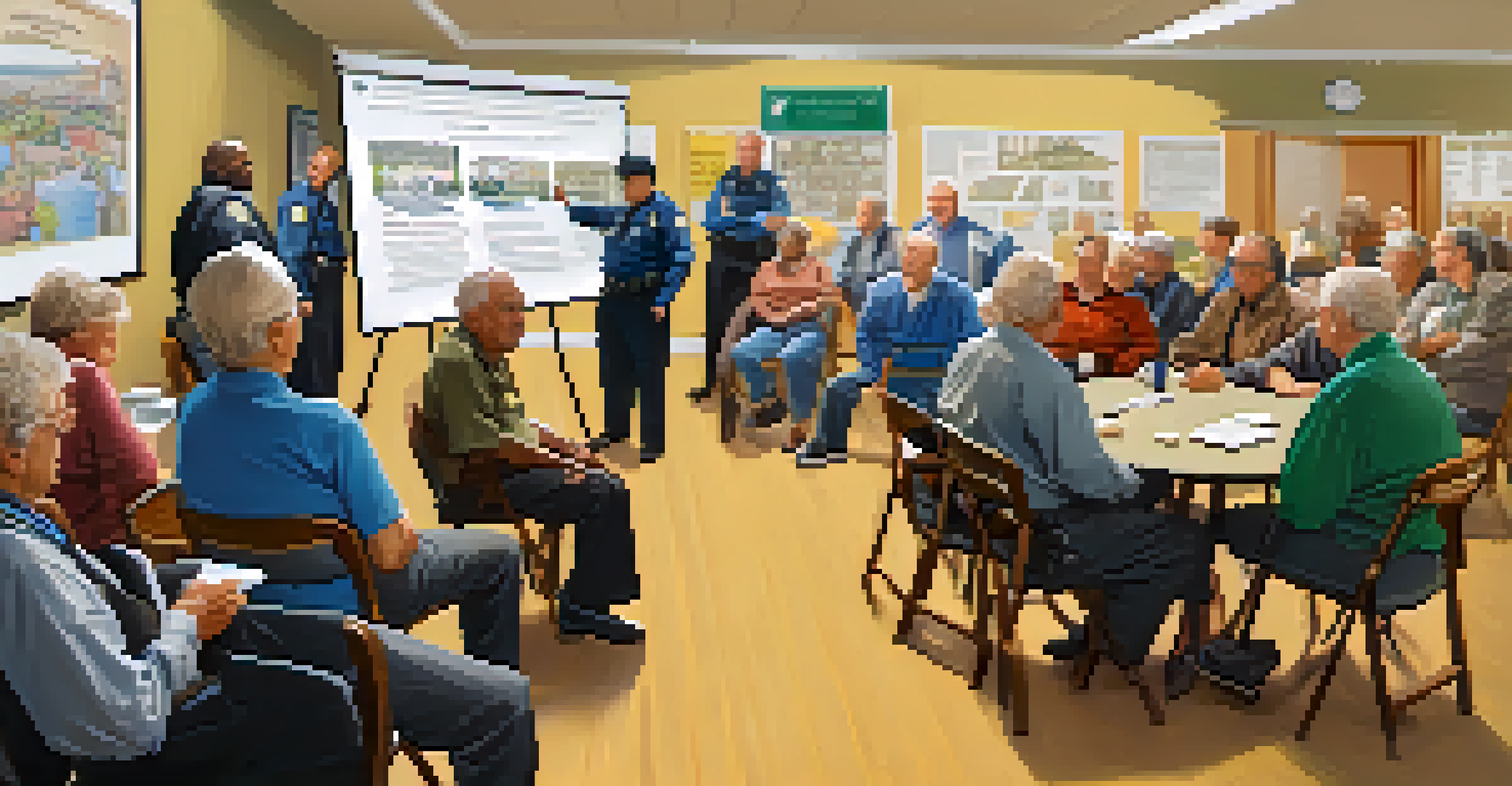Home Security for Seniors: Tips for Enhanced Safety

Understanding the Unique Security Needs of Seniors
As we age, our security needs can change significantly. Seniors may face unique challenges that require tailored solutions to ensure their safety at home. For instance, mobility issues can make it harder to secure doors and windows, necessitating easy-to-use locking mechanisms.
The safety of the elderly is a community responsibility that we all share.
Additionally, seniors may be more vulnerable to scams and break-ins, making it crucial to understand potential threats. Awareness of these risks helps in establishing a proactive approach to home security. Knowing what makes a home a target is the first step towards effective protection.
By recognizing these unique security needs, we can create a safer living environment for seniors. Simple modifications and precautions can make a significant difference. The goal is to empower seniors to feel secure and confident in their homes.
Installing Effective Locks and Deadbolts
One of the simplest yet most effective ways to enhance home security is by upgrading locks. Standard door locks can often be easily picked or bypassed, so investing in high-quality deadbolts is essential. These locks provide an extra layer of protection against intruders.

When selecting locks, seniors should look for user-friendly options. Lever handles, for instance, are easier to operate than traditional doorknobs, especially for those with arthritis or limited hand strength. This ensures that security doesn’t come at the cost of accessibility.
Moreover, it’s important to regularly check and maintain these locks. A simple routine of testing the functionality can prevent lock failures during emergencies. This proactive approach not only enhances safety but also promotes peace of mind.
Utilizing Home Security Systems and Alarms
Home security systems have come a long way, offering a range of options that cater specifically to seniors. Modern systems can include motion detectors, video cameras, and alarms that alert authorities in case of a break-in. These technologies not only deter potential intruders but also provide timely assistance when needed.
An ounce of prevention is worth a pound of cure.
Many systems can be monitored via smartphones, allowing seniors to keep an eye on their homes from anywhere. This added convenience can empower them to take control of their security. For those who may not be tech-savvy, user-friendly interfaces make it easier to manage these systems.
In addition to monitoring, many security companies offer emergency response services. Having professionals ready to respond can be a game-changer for seniors living alone, providing an extra layer of reassurance. It’s about creating a network of safety that’s just a button press away.
Enhancing Outdoor Lighting for Safety
Proper outdoor lighting is an often-overlooked aspect of home security. Well-lit exteriors can deter intruders, as they prefer to operate in the shadows. Motion-sensor lights are especially effective, as they illuminate areas only when movement is detected, catching potential threats off guard.
For seniors, ensuring that walkways and entry points are well-lit can prevent accidents and enhance safety. Installing lights at key locations, like entrances and driveways, makes it easier to navigate in the dark. This is particularly important for seniors who may have mobility challenges or reduced vision.
Additionally, consider using timers or smart lighting systems that can simulate occupancy when seniors are away. This can create the illusion of someone being home, further deterring potential burglars. With the right lighting, seniors can feel safer both inside and outside their homes.
Establishing a Neighborhood Watch Program
Building a sense of community can be one of the most effective security measures for seniors. Establishing a neighborhood watch program encourages residents to look out for each other and report suspicious activities. This camaraderie can significantly enhance the safety of the entire neighborhood.
Seniors can take an active role in organizing community meetings to discuss safety concerns and strategies. This not only fosters relationships among neighbors but also empowers seniors to voice their security needs. A united community is often more resilient against crime.
Moreover, involving local law enforcement in these discussions can provide valuable insights and resources. Police often appreciate community involvement and can offer tips tailored to the area’s specific challenges. Together, a neighborhood watch can create a protective network that benefits everyone.
Keeping Personal Information Private
In an increasingly digital world, protecting personal information is vital for seniors. Many scams target older adults, often exploiting their trust and lack of digital knowledge. It’s crucial to educate seniors about the importance of safeguarding sensitive information, both online and offline.
For instance, seniors should be cautious about sharing personal details over the phone or on social media. Scammers often pose as trusted institutions, so verifying the identity of callers is essential. Simple rules, like not giving out personal information unless absolutely necessary, can greatly enhance safety.
Additionally, regularly monitoring bank statements and credit reports can help catch any fraudulent activity early. Encouraging seniors to use secure passwords and consider identity theft protection services can add another layer of security. The goal is to empower them to take charge of their personal safety in all aspects.
Establishing Emergency Plans and Contacts
Having a well-thought-out emergency plan is critical for seniors. This plan should include a list of emergency contacts, local authorities, and nearby family or friends who can assist in case of an incident. Knowing whom to reach out to during a crisis can significantly reduce panic and confusion.
Moreover, practicing emergency drills can help seniors feel more prepared. Simple scenarios, such as what to do in case of a fire or a break-in, can be discussed and rehearsed. This practice not only builds confidence but also ensures that everyone knows their role in an emergency.

Incorporating technology can also enhance these emergency plans. For example, carrying a medical alert device can provide immediate assistance if needed. This combination of preparation and technology can create a comprehensive safety net that gives seniors peace of mind.
Regularly Reviewing and Updating Security Measures
Security is not a one-time fix; it requires ongoing attention and adjustments. Seniors should regularly review their home security measures to ensure they remain effective. This could involve checking locks, updating alarm codes, or evaluating the need for additional security features.
Engaging family members or trusted friends in these discussions can provide valuable perspectives. They might spot areas for improvement that seniors may overlook. Creating a checklist can be a practical way to keep track of necessary updates.
Additionally, staying informed about new security technologies and trends is vital. As crime tactics evolve, so should the strategies to counter them. By remaining proactive, seniors can maintain a safe and secure home environment for years to come.